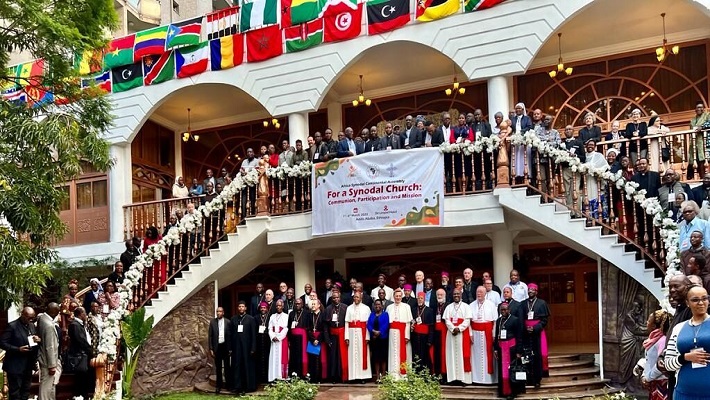By Paschal Norbert
VATICAN CITY, APRIL 18, 2023 (CISA)– The Final Document from the African Synodal Continental Assembly submitted to the General Secretariat of the Synod in the Vatican underscores the Church in Africa has lived out Synodality since the Second Vatican Council. It highlights the need for recognition of the role women and youth play in the Church and proposes pastoral care that focuses on marriage and family and their challenges in modern-day Africa.
The document compiled by the Symposium of Episcopal Conferences of Africa and Madagascar (SECAM) and adopted by the African Continental Synodal Assembly in Addis Ababa, Ethiopia, on March 5, 2023, foregrounds 20 ‘intuitions’ that resonate strongly with the lived experiences and realities of the Church in Africa and emphasizes eight points “to be recurrent and urgent priorities on which it is important to continue discernment at the level of the universal Church.”
Among the intuitions put forward by the continental assembly is the need for the participation of women, youth and physically challenged persons in the life of the Church.
“Women form a greater percentage of active members of the Church. They make meaningful contributions to the life and mission of the Church. Many of them feel that they are not given a sufficient place in the decision-making structures of the Church. There is a call to create more opportunities and structures for women to do more in the Church,” the document highlights.
“The youth also complained that they would like to be more visible in the life of the Church. An idea that was strongly felt was that of a preferential option for the youth. There is a call to adapt the activities and celebrations of the Church to styles that will attract and maintain the youth in the Church,” it says.
The document calls for recognition of the value of every faithful as it “imposes the necessity of taking their opinions into consideration for proper discernment and decision-making,” and that the Synodal Church ought to balance “her care for spiritual issues with her care for material problems.”
“Just as Jesus fed the hungry,” it postulates “The Synodal Church should seek to balance her efforts in addressing the concrete issues in people’s lives with the spiritual aspects. This idea comes from the experience of some people who believe that the Church seems to concentrate more on their spiritual needs than on concrete material needs.”
Addressing the needs of people who feel marginalized “for example, people in polygamous marriages, divorced and remarried, and single parents.” The document spotlights their desire for the Church to revisit her position on those “irregular family situations.”
“How does the openness of the family apply to such people in the spirit of Synodality that encourages the Church to walk together with all believers? And what domestic arrangements have we overlooked?” it poses.
“In Africa, we are faced with the challenges of broken marriages based on traditional practices that have been difficult to transform through Christian values and other socio-economic factors, including polygamy which is still imposed by some social conditions in African societies. Divorce is also becoming a common occurrence. There is equally the situation of elective and circumstantial single parenthood, widowhood and cohabitation. We equally note the necessity of protecting children from abuse. People involved in these still want to remain practising Catholics. There is a need to develop an evangelizing family pastoral care and catechesis that will make it possible to help them to live their faith with confidence and joy,” the document proposes.
The Final Document challenges the Holy See to take into consideration the African voices and values “when elaborating the doctrines and teachings of the church, values such as family, solidarity, communitarian life, reverential dialogue, hospitality and co-responsibility.”
It explains, “Africans have equal responsibility for the doctrines and teachings of the Church in collaboration with other local Churches (Eph. 2:19). Accordingly, it is paramount that their experiences and ever-evolving cultural values be taken into consideration and their problems be always equally considered. This will help them to own the teachings and to be committed to living them out.”
The Final African Continental Synodal Document also recognizes the external and internal threats against the Synodal spirit and the forces opposed to this mission of the Church.
“Such forces include ideologies and economic or political policies that are prejudicial to the doctrines of the faith. Some of these forces influence Church leaders and put pressure on theologians with the intention of diluting the content of the faith. There is a call for the Synodal Church to be awake to such influences and remain focused on the Word of God and the firm tradition of the Church,” warns the African Synodal Continental Synodal Assembly.

